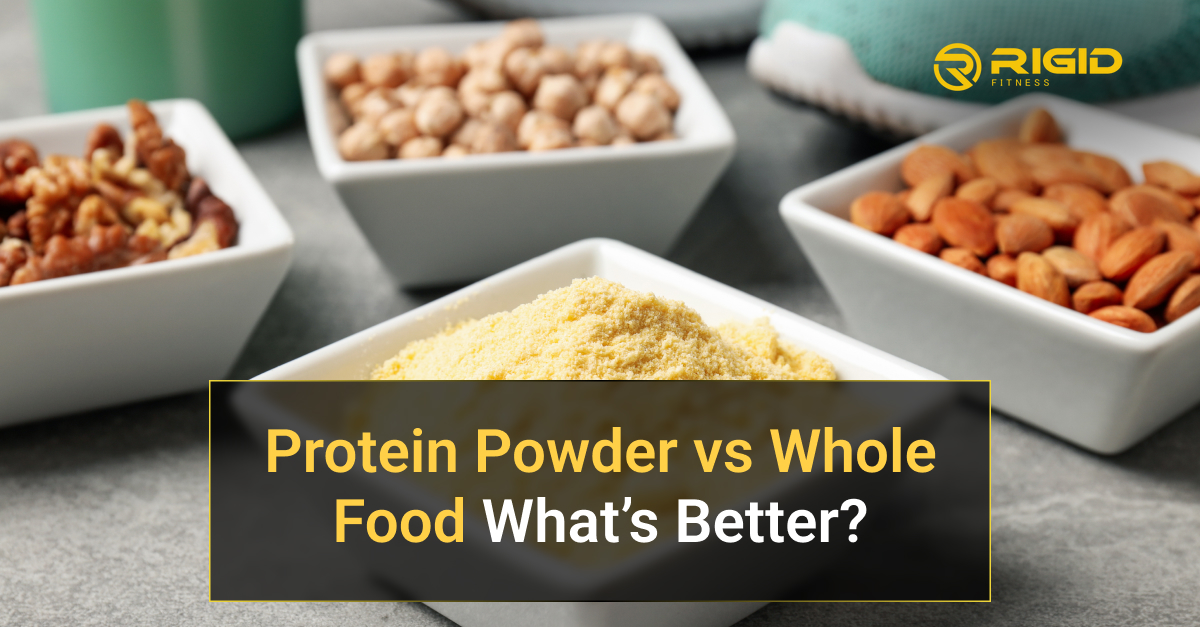

When it comes to nutrition, few topics spark as much debate as protein powder vs whole food. Whether you’re an athlete aiming to build muscle, someone trying to lose weight, or just seeking balanced nutrition, protein is a key part of your diet. But with shelves packed with shiny tubs of protein supplements and social media flooded with smoothie recipes, it’s easy to wonder, should you rely on protein powders or stick to whole food sources?
Let’s dive into the science, benefits, and drawbacks of both so you can make the best choice for your goals and lifestyle.
Protein is often called the building block of life, and for good reason. It helps repair muscle tissues, supports immune function, regulates hormones, and even keeps you feeling full after meals. Without enough protein, your body struggles to maintain muscle mass, energy levels, and overall health.
For adults, the general recommendation is around 0.8 grams of protein per kilogram of body weight, but for active individuals or those training regularly, needs can rise to 1.2–2.0 grams per kilogram. That’s where the protein powder vs whole food question becomes critical, because how you meet those requirements can affect your energy, digestion, and long-term wellness.
Protein powders are concentrated protein sources made from animal or plant materials. They’re designed to offer a convenient and fast way to meet daily protein needs, especially for people with busy schedules or specific fitness goals.
Common Types of Protein Powders
When exploring protein powder vs whole food options, make sure your supplement choice is safe and effective. Look for:
For fitness enthusiasts, protein powders like these are a go-to choice. It provides high-quality whey isolate with essential amino acids that promote lean muscle recovery and growth after workouts.
One of the biggest practical questions around protein powder is how to mix it easily and without clumps. This is where RIGID FITNESS comes in and offers products that stand out as excellent tools for anyone using supplements.
The RIGID FITNESS Shaker Bottle is an essential tool for anyone who relies on protein supplements as part of their nutrition plan. Designed with a built-in stainless-steel whisk ball and a leakproof, BPA-free body, it ensures your protein shakes are smooth and clump-free every time.
Its durable design makes it perfect for daily use, whether you’re heading to the gym, office, or traveling. With added storage compartments for supplements or snacks, the RIGID FITNESS Shaker combines practicality and performance in one sleek design.
For those who prefer extra convenience, the RIGID FITNESS Portable USB Blender Bottle offers a modern upgrade. This compact, rechargeable blender quickly mixes protein powder with milk, fruit, or oats, helping you enjoy nutrient-rich shakes wherever you are.
Together, these shaker options make sticking to your fitness goals easier, blending the best of protein powder vs whole food nutrition into one simple, portable solution.
Whole foods, on the other hand, are natural, unprocessed sources of protein, like chicken, eggs, beans, lentils, tofu, nuts, fish, and dairy. Unlike supplements, whole foods deliver a complete nutritional package that includes fiber, vitamins, minerals, and healthy fats.
For example, a breakfast of scrambled eggs and whole-grain toast gives you protein, complex carbs, and healthy fats, all working together to stabilize energy and improve recovery.
When it comes to protein powder vs whole food, neither is inherently “better” for everyone. The best option depends on your goals, schedule, dietary restrictions, and personal preferences.
| Category | Protein Powder | Whole Food |
| Convenience | Extremely easy to use, just mix and drink | Requires preparation and cooking time |
| Nutritional Value | High protein, but may lack other nutrients | Provides complete nutrition (fiber, vitamins, minerals) |
| Digestibility | Fast absorption, ideal post-workout | Slower digestion, provides sustained energy |
| Satiety | May not keep you full for long | More filling due to fiber and fats |
| Cost | Can be pricey over time | Often cheaper per serving |
| Additives | May include artificial ingredients | 100% natural, minimal processing |
| Use Case | Great for muscle recovery and convenience | Ideal for balanced, everyday meals |
In short, protein powder vs whole food isn’t a black-and-white debate; it’s about balance. Powders offer ease and speed, while whole foods offer holistic nourishment.
Protein powders are not meant to replace all your meals—but they can be incredibly useful in certain situations.
After an intense workout, your muscles are in repair mode and need protein fast. A shake made with a scoop of Whey Protein delivers amino acids quickly, helping muscle fibers rebuild and grow stronger.
If you’re constantly on the go, getting enough protein from meals can be tough. A smoothie with protein powder, fruit, and oats can be a lifesaver during a hectic day.
Protein helps control hunger and supports metabolism. Having a shake between meals can reduce snacking and cravings.
For vegetarians or vegans, plant-based protein powders are a convenient way to ensure adequate protein intake without relying on meat or dairy.
Whole foods should remain the foundation of any healthy diet. They provide the diversity of nutrients your body needs for long-term well-being, something powders can’t fully replicate.
You can’t live on shakes forever. Whole foods teach kids and adults alike how to enjoy balanced meals with real textures, flavors, and nutrients.
Whole foods often contain prebiotics and fiber that promote healthy digestion, something powders typically lack.
Whole foods deliver micronutrients like B vitamins, omega-3s, and antioxidants that help your body function optimally.
Minimizing reliance on processed supplements helps your body stay in sync with natural energy sources.
The debate over protein powder vs whole food ultimately comes down to lifestyle. If you value convenience and need a quick protein fix, powders are great. But if you want complete nutrition, whole foods should form the core of your diet.
A good rule of thumb:
This ratio ensures you enjoy both variety and efficiency without compromising health.
The truth is, you don’t have to choose sides in the protein powder vs whole food debate. In fact, the best nutrition strategies often combine both. You might have whole food meals during the day and use a protein shake to fill in gaps or support post-workout recovery.
Here’s an example of a balanced day:
By combining both options, you get the nutrient density of whole foods and the efficiency of protein powder.
In the end, there’s no one-size-fits-all winner in the protein powder vs whole food discussion. Both have their place in a balanced diet. Whole foods nourish your body with complete nutrients and satisfaction, while protein powders offer speed, convenience, and precision, especially for fitness goals.
For the best results, use both intelligently. Eat real food most of the time, and let a trusted supplement, whey protein, fill in the gaps when life gets busy. That way, you’ll fuel your body efficiently, support your workouts, and build the strong, healthy physique you’re striving for.

Introduction Training at home has become one of the most practical ways to stay active, especially when space, time, or

As the year wraps up, many across the UAE are reflecting on life, goals, and most importantly, health. In a

Staying active at home has never been more important. With busy schedules, limited gym access, and the desire for convenience,

